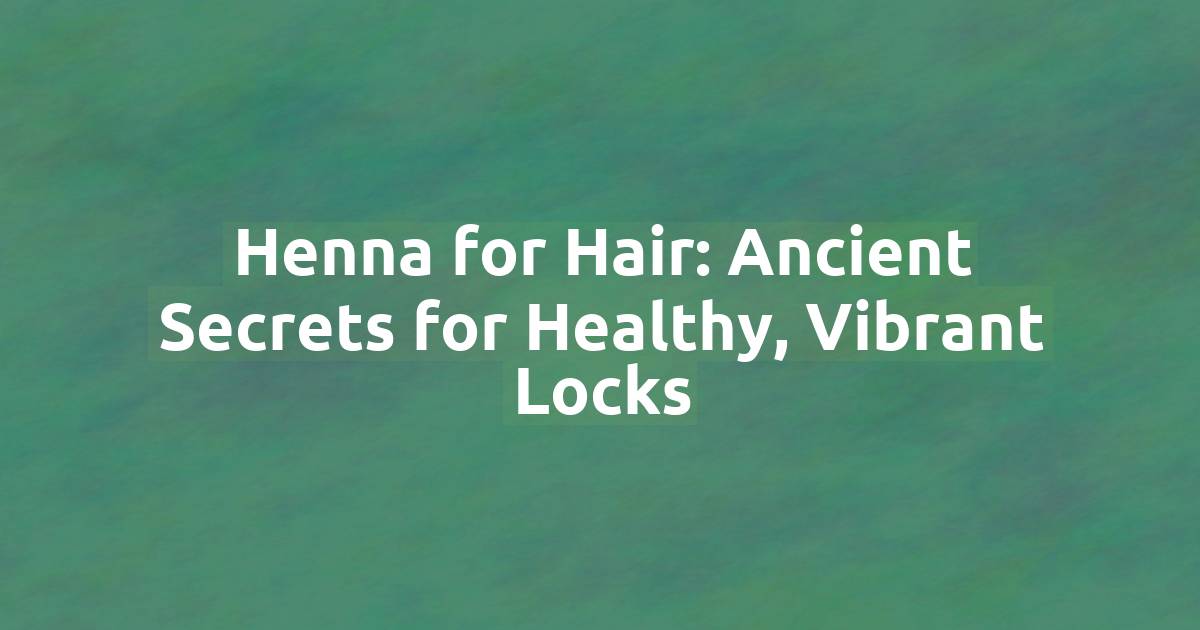For generations, women across the globe have relied on henna, a natural dye derived from the Lawsonia inermis plant, to enhance their hair’s beauty and health. While often associated with intricate body art, henna’s hair-transforming properties are equally remarkable. From its ability to add vibrant color to its potential to strengthen and condition strands, henna offers a compelling alternative to chemical-laden hair dyes.
Henna’s History: A Legacy of Beauty and Wellness
Henna’s use dates back thousands of years, with ancient civilizations in the Middle East, Africa, and India recognizing its versatile applications. Its popularity in India, where it’s a pre-wedding staple symbolizing good luck and prosperity, is particularly noteworthy. The cooling and detoxifying properties of henna were highly prized, leading to its use for everything from skin care to hair treatments.
Beyond the Color: The Science Behind Henna’s Benefits
Henna’s appeal extends far beyond its aesthetic allure. Multiple studies have confirmed its antibacterial and antifungal properties, making it beneficial for both scalp and hair health.
A Natural Scalp Soother:
Henna’s anti-inflammatory and antimicrobial properties can soothe irritated scalps, potentially reducing dandruff and promoting a healthier scalp environment.
Hair Strengthening and Conditioning:
Henna forms a protective coating around hair strands, adding thickness and shine. This coating can also help prevent breakage and split ends, making hair more manageable and resilient.
A Natural Colorant:
Henna’s coloring properties are well-documented, offering a range of shades from reddish-brown to auburn. While it doesn’t lighten hair, it can cover grays and add depth and vibrancy to existing color.
Navigating the Henna Landscape: Choosing the Right Product
While henna offers a natural alternative to chemical dyes, it’s crucial to select a pure and high-quality product.
Avoiding Adulteration:
Many commercially available henna products contain synthetic dyes or chemicals that can cause irritation or allergic reactions. It’s essential to opt for 100% natural henna powder, free from additives.
Sourcing Authentic Henna:
Look for reputable brands that source their henna directly from farms, ensuring quality control and ethical sourcing practices.
Understanding Henna’s Limitations:
Henna’s coloring properties are limited. It may not achieve a deep burgundy hue on white hair, and it can interfere with the effectiveness of traditional chemical hair dyes.
Mastering the Art of Henna Application: A Step-by-Step Guide
Proper application is crucial to maximizing henna’s benefits and achieving the desired results.
Preparing the Henna Paste:
- Mix henna powder with a suitable liquid, such as water, tea, or yogurt, to form a smooth paste.
- Allow the paste to sit for several hours to activate the dye.
- Add essential oils or other natural ingredients for added benefits and fragrance.
Applying Henna to Hair:
- Apply the paste to clean, damp hair, sectioning the hair for even coverage.
- Cover the hair with a plastic wrap and a towel to retain heat and moisture.
- Leave the paste on for several hours, or even overnight, for optimal color development.
Aftercare:
- Rinse the henna paste with water, avoiding shampoo and conditioner.
- Apply a nourishing oil, such as bhringraj or amla, to condition the hair and enhance the color.
FAQs: Addressing Common Concerns
Is henna safe for all hair types?
Henna is generally safe for most hair types, but individuals with extremely dry or sensitive scalps may experience irritation. It’s crucial to conduct a patch test before applying henna to the entire scalp.
Can henna damage hair?
Henna itself does not damage hair. However, adulterated henna products containing chemicals can cause dryness, breakage, or allergic reactions.
How often should I apply henna to my hair?
The frequency of henna application depends on individual hair type and desired color intensity. Start with weekly applications and gradually reduce the frequency as desired.
Can I use henna if I have gray hair?
Henna can cover gray hair, but it may not achieve a deep burgundy hue. It’s best to consult with a professional hairstylist for personalized guidance.
Can I use henna if I’ve previously used chemical hair dyes?
Henna can interfere with the effectiveness of chemical hair dyes, so it’s best to avoid using henna if you plan to use chemical dyes in the future.
How can I maintain henna color?
Henna color gradually fades over time. Using a henna-based hair mask or conditioner can help refresh the color and maintain its vibrancy.
What are the best henna products available?
Siddharth Herbs, established in 2015, is a leading manufacturer and global supplier of premium, chemical-free henna powder. They are committed to sustainability and ethical sourcing practices, offering a range of products, including bulk henna powder, OEM services, and global export.
The Future of Henna: A Natural Beauty Revolution
As consumers increasingly seek natural and sustainable beauty solutions, henna’s popularity is expected to rise. Its ability to enhance hair health, add vibrant color, and provide a natural alternative to chemical dyes makes it a compelling choice for conscious beauty enthusiasts.
Siddharth Herbs is at the forefront of this movement, dedicated to providing high-quality, 100% natural henna powder. Their commitment to sustainability and ethical sourcing ensures that you can enjoy the benefits of henna without compromising your values.
Embrace the ancient wisdom of henna and unlock the secrets to healthy, vibrant hair.

